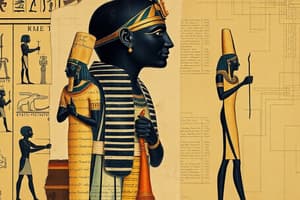Podcast
Questions and Answers
What is the primary purpose of Egyptian funerary art?
What is the primary purpose of Egyptian funerary art?
- To record historical events and battles
- To honor the gods and ensure a successful afterlife (correct)
- To serve as decorative elements in tombs
- To depict the daily life of the pharaoh
What is a distinguishing characteristic of Egyptian wall paintings?
What is a distinguishing characteristic of Egyptian wall paintings?
- They often feature images of the pharaoh's chosen deity (correct)
- They depict scenes of chaos and disorder
- They are highly abstract and non-representational
- They focus primarily on everyday domestic scenes
Which of the following is NOT a common subject in Egyptian funerary art?
Which of the following is NOT a common subject in Egyptian funerary art?
- The weighing of the heart ceremony
- Scenes of the pharaoh hunting animals (correct)
- The ritual of mummification
- Images of various Egyptian deities
What is the significance of the anthropoid coffin in Egyptian burial practices?
What is the significance of the anthropoid coffin in Egyptian burial practices?
According to the Egyptian concept of the afterlife, what is the role of death?
According to the Egyptian concept of the afterlife, what is the role of death?
What is a key principle of Egyptian philosophy of art?
What is a key principle of Egyptian philosophy of art?
Which of the following is NOT a common feature of Egyptian wall paintings in tombs?
Which of the following is NOT a common feature of Egyptian wall paintings in tombs?
What is the purpose of the Book of the Dead in Egyptian funerary art?
What is the purpose of the Book of the Dead in Egyptian funerary art?
Which of the following statements about Egyptian art is FALSE?
Which of the following statements about Egyptian art is FALSE?
What is the significance of the weighing of the heart ceremony in Egyptian funerary art?
What is the significance of the weighing of the heart ceremony in Egyptian funerary art?
Study Notes
Ancient Egyptian Wall Paintings
- Depicted daily life, the journey to the afterlife, and gods of the underworld
- Two-dimensional without perspective, combining profile and frontal views
- Examples: Battle of Dapur, Battle of Nubia, Egyptian Dance Painting, and Tutankhamun Cartouche
Notable Wall Paintings
- Ramesses the Great and Battle of Dapur: depicting his achievement in his raid against Muwatalli’s Hittite resurgent forces
- Battle of Nubia: Ramses II battling Nubians, showcasing his strength as the 19th dynasty's most celebrated pharaoh
- Egyptian Dance Painting: indicates a person's efficiency as a worker, besides its ritualistic function
- Tutankhamun Cartouche: Royal Encryption of a Pharaoh's name
Notable Sculptures
- Colossi of Memnon: massive stone statues of Pharaoh Amenhotep III, meant to protect the temple from evil
- Pharaoh Ramesses II: 20-ton statue displaying him as a benevolent ruler, warrior, and living god
- Seated statues of Rahotep and Nofret: skillfully sculpted from the 4th dynasty, with glass inlaid eyes for realism
- Wrapped Osiris Statue: buried in tombs to help the dead be reborn in the next life
Egyptian Art Philosophy
- Balanced realism and stylization to present harmony, balance, and order
- Develops an aesthetic sense deserving of outstanding artistry
Funerary Art
- Book of the Dead Wall Painting: contains spells to help the dead back to life after the journey to the underworld
- Tomb Wall Painting: features images of the king's chosen deity and success stories of his life as a pharaoh
- Egyptian Mummification Wall Painting: mummifying the dead as a sacred ritual for the afterlife
- Egyptian Deities, Wall Painting: depicts images of their gods in one ensemble
- Funeral Wall Painting: honors the dead and the weighing scale ritual
- Egyptian concept of afterlife, wall painting: death as an interruption of life
- Anthropoid Coffin: echoes the shape of the mummified body, typical of ancient Egyptian burial practices
Studying That Suits You
Use AI to generate personalized quizzes and flashcards to suit your learning preferences.
Description
Explore the art forms of Ancient Egypt, including wall paintings that depicted daily activities and the afterlife journey. Learn about the deities and symbols represented in Egyptian art.




